Are you concerned someone you know is having thoughts of suicide? Many, many people think about suicide at some point in their lifetime – around one in five of us – but the overwhelming majority do not go on to take their own lives.
If you’re worried that someone who may be feeling suicidal it can be really hard to know what to say to them, and how to help. But there is hope, people do recover, and all of us have the ability to recognise and support someone who is experiencing thoughts of suicide, and to save lives. Download our pocket guides Worried about someone and Safety Planning or continue reading to find out more.
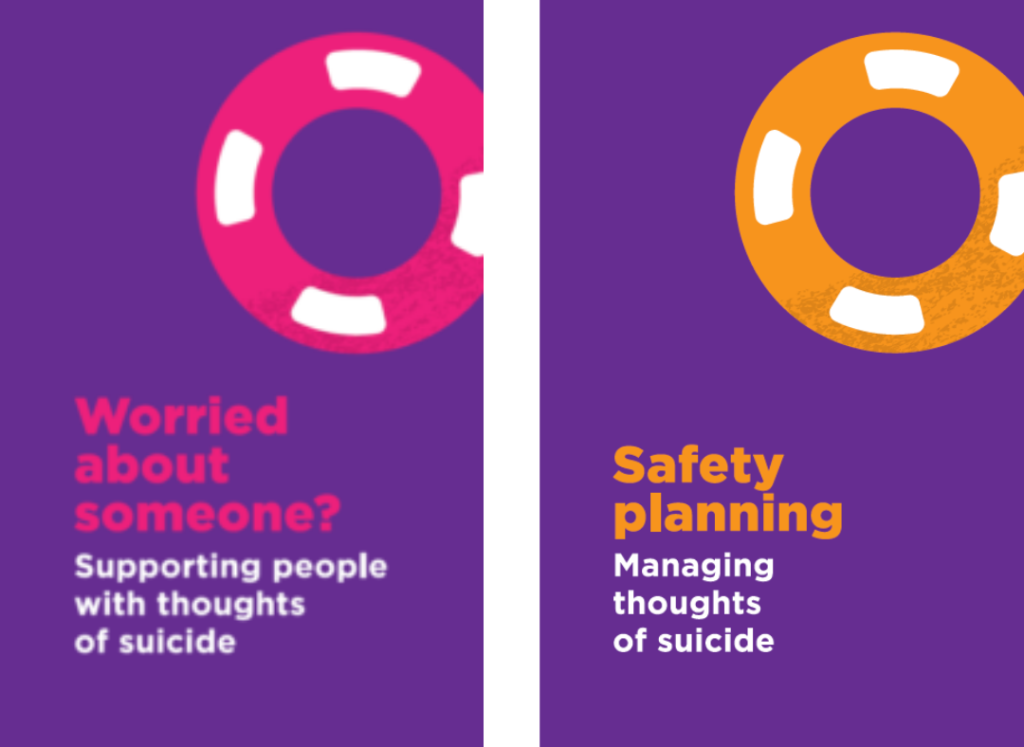
Suicidal feelings can vary in intensity. They may be fleeting and occur only once, but for others these thoughts might be there long term, or come and go in response to changing moods or life events.
Thoughts of suicide can happen for many reasons. Someone may feel so low that life seems unbearable. Or they may have suffered a loss or life changing circumstances such as a relationship breakdown, loss of a job or money problems that makes them feel like death is the best solution. The stigma associated with suicide can also mean the person may feel very alone and isolated, and unable to reach out for help.
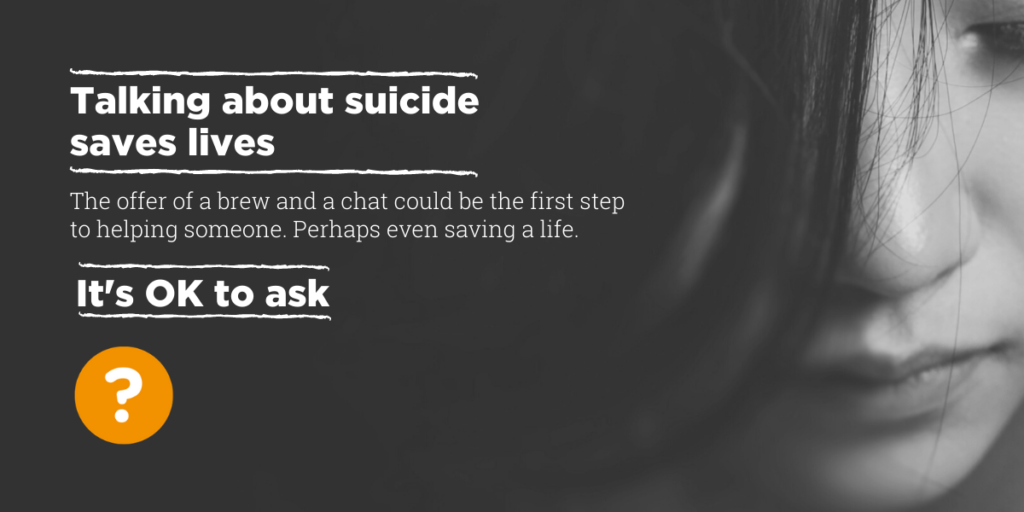
Trust your gut instincts. If you are at all concerned that someone is having thoughts of suicide – ASK them – And ASK directly. Are you having thoughts of suicide?
Many people contemplating suicide do not let their friends or family know directly how they are feeling – but often there are warning signs that someone may be feeling suicidal – signs we can be alert to. Read on to find out more. Asking directly about thoughts of suicide will not put ideas in someone’s head and the conversation that follows could be a lifesaver.
Find out more
What is suicide?

Suicide means to end your life intentionally, and experiencing thoughts of suicide can be distressing and frightening.
Anyone can experience thoughts of suicide and everyone is different; what makes suicide feel like an option to one person might be experienced very differently by someone else. And that’s okay.
Suicidal feelings can vary from person to person. The intensity of the thoughts may build up slowly, or be more overwhelming from the start. For some people thoughts of suicide may be fleeting and occur only once, but for others these thoughts might be long term, or come and go in response to changing moods or life events.
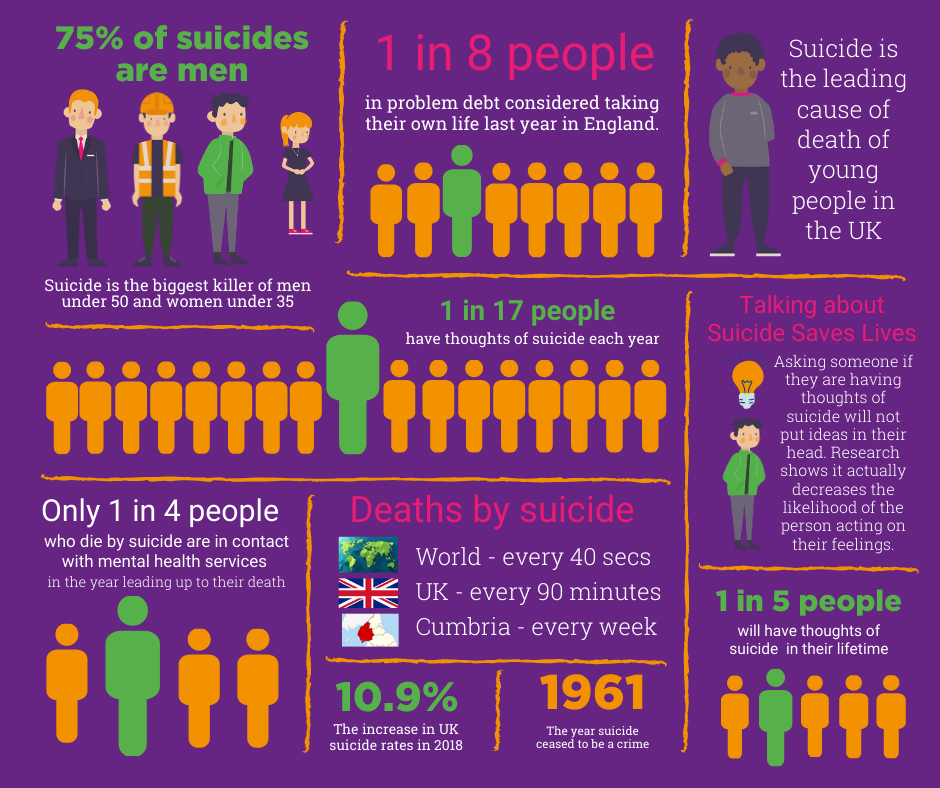
Suicidal feelings may begin as fleeting thoughts of wanting to disappear or escape and can develop into being preoccupied by thoughts about ending your life and thinking about methods of suicide, or making clear plans to take your own life.
Thoughts and feelings might include:
hopelessness, like there is no point in living
that people would be better off without you
tearful and overwhelmed by negative thoughts
unbearable pain that you can’t imagine ending
useless, unwanted or unneeded by others
desperate, as if you have no other choice
Thinking about suicide does not mean that someone will act on these thoughts though.
And it’s important to remember though that these intense thoughts and feelings will pass.
Why does someone feel suicidal?

Some people can say why they feel suicidal, but others may not have a clear reason, or they may struggle to talk about what they are feeling or experiencing.
We all go through tough times. People may feel suicidal because something has happened which feels too overwhelming for them to cope with, they may feel trapped and unable to escape from the situation. It may have been a situation that has been building up over time or be a recent event. Whatever it is it may leave the person feeling isolated and alone and believing that people would be better off without them.
When we feel like this, or when things happen we feel unable to cope with, or overwhelmed by, suicide can start to feel like the only option to escape.

Struggling to cope and having thoughts of suicide can stem from many different situations, such as:
job loss, redundancy or failure of a business
money or housing problems
bullying and discrimination
adjusting to a big change, such as retirement, pregnancy or parenthood
sexual, domestic or physical abuse
long-term physical pain, illnesses or mental health problems
bereavement or losing a loved one to suicide
relationship breakdowns or losing access to children
isolation or loneliness
addictions such as gambling, alcohol or drugs
being in prison
feeling inadequate or a failure, or that good things happening to others around you
cultural pressure, such as forced marriage, or doubts about your sexual or gender identity
Thoughts of suicide may also arise as a result of an accumulation of seemingly minor events, from the ‘straw that broke the camels back’.
And sometimes even seemingly positive life events can result in thoughts of suicide. Suicide is the biggest killer of new mothers in the UK.
Thoughts of suicide may become more intense if a person drinks alcohol, uses recreational drugs or has sleep problems.
What’s important to know is that whatever the reasons someone feels suicidal, these reasons are significant and valid.
Who is at risk of suicide?
![]()
Around 75% of all suicides are men, and suicide is the biggest killer of men under 50
Just as there may be a very wide variety of causes, anyone can have suicidal feelings, whatever their background or life situation. There is no such thing as ‘the suicidal type’. But we know that some groups of people are more vulnerable to suicide;
around 75% of all suicides are men, and suicide is the biggest killer of men under 50
suicide is the biggest killer of young people under 25
people bereaved by suicide are themselves more likely to take their own lives
people who have previously attempted suicide, or who have self-harmed
armed forces veterans, substance misuse, LGBTQ and other challenged communities

What are the warning signs?
![]()
It’s important to trust your gut instincts. If you are at all concerned someone may be having thoughts of suicide, say something. Saying something is safer than saying nothing.
Not everyone who is contemplating suicide lets their friends or family know directly how they are feeling. Many people find it very hard to talk about suicidal feelings – this can be because they are worried about how others will react or because they cannot find the words.
Correctly interpreting how someone else is feeling can be difficult. There may not be any obvious warning signs and sometimes people who have reached rock bottom can be very skilled at hiding their thoughts and feelings. So it’s very important not to blame yourself if you aren’t able to spot the signs that someone is feeling suicidal.
Usually though, there are warning signs that someone is feeling suicidal. Some are obvious but others can be quite subtle, and we may need to pay attention to see them.

There is no exhaustive list of warning signs or ‘invitations’ but being alert to what people are saying, changes in their behaviour, what they are thinking and feeling and what’s happening in their lives could all be indicators that someone is experiencing thoughts of suicide. Explore below what these signs or invitations could be….
What someone is SAYING

Talking about wanting to die or to kill themselves, even if these statements are veiled, vague or even jokey. “I just can’t take it anymore,” or “What’s the use?” or “I’ve had enough, I can’t go on”.
Talking about feeling hopeless or having no reason to live
Talking about feeling trapped or not being able to see a way out of their situation
Talking about being a burden to others, or that everyone would be better off without them
Talking about seeking revenge or expressing deep rage at others
Saying goodbye to friends and family as if they won’t be seeing them again
Talking about what the world might be like without them
Social media posts reflecting the above, or that seem concerning and/or cryptic eg “goodbye cruel world”, “The hardest thing is not saying goodbye”, “How many of you would miss me if I wasn’t here?”
How someone is BEHAVING
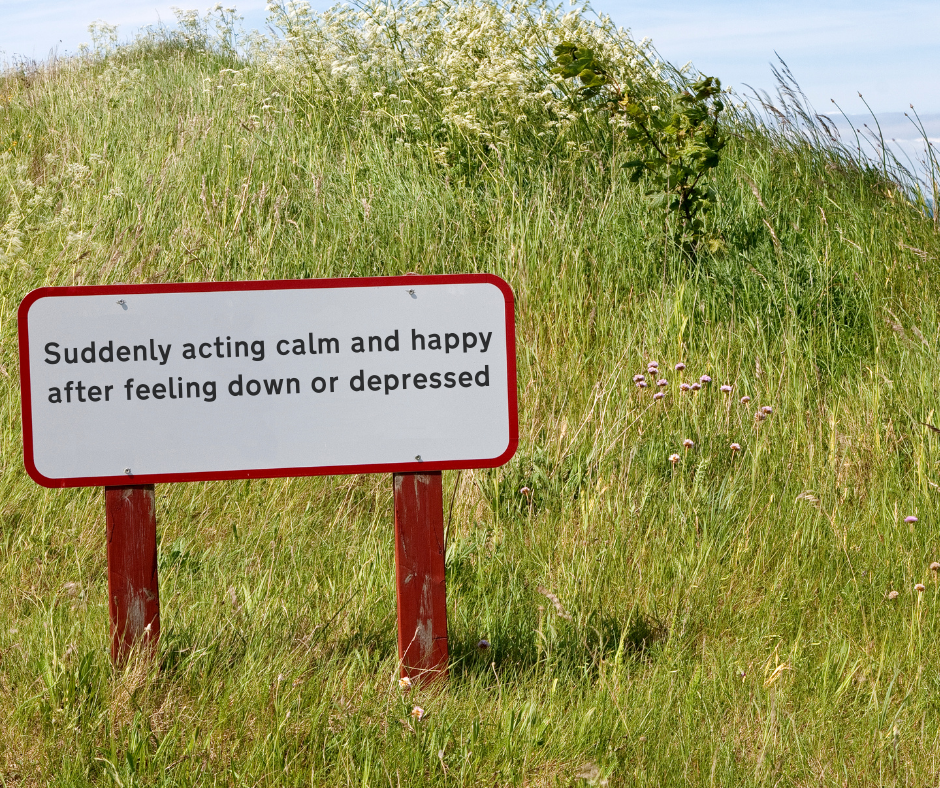
Risky behaviour with little concern about the consequences
Unexpected mood changes such as suddenly being calm and happy after being very depressed
Giving away, or clearing out their possessions or making a will
Researching ways to kill oneself online or other suicide related searches
Increased use of alcohol or drugs
Withdrawing from friends and family
Caring less about their work, lateness and carelessness on the job
Starting or increasing Self-harming behaviour
Changes in appetite
Losing interest in most things, including own appearance
Trouble sleeping, or sleeping too much
Increasingly distracted by their own thoughts and feelings
What’s HAPPENING in their lives
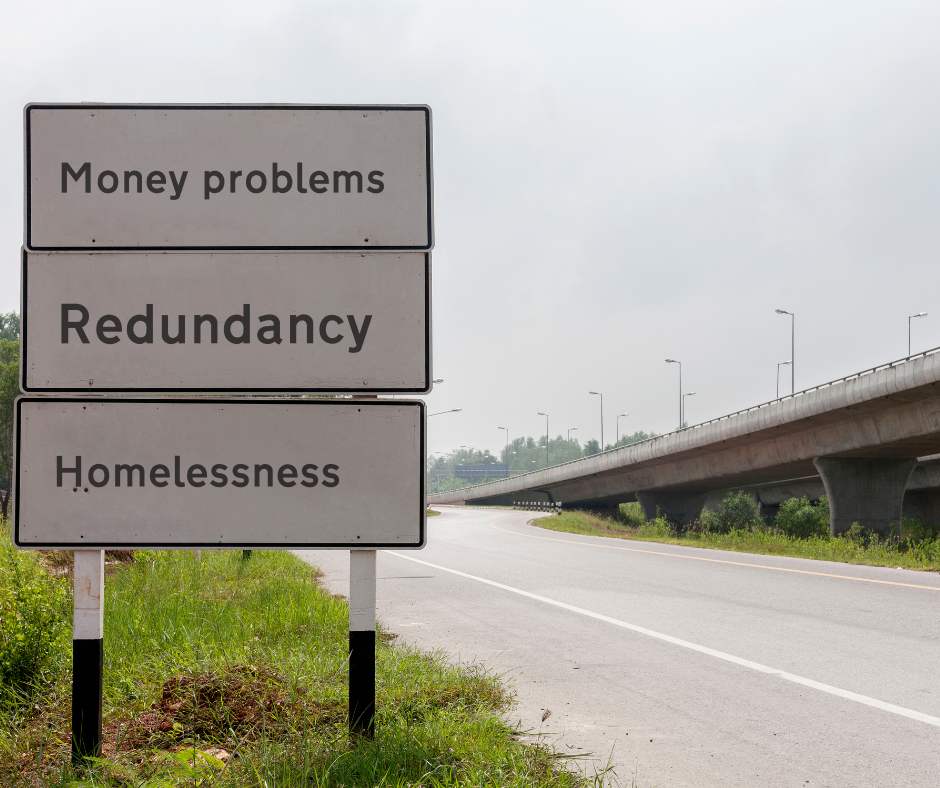
A major loss or change such as a bereavement, retirement, relationship breakdown or redundancy
Losing control of their lives through homelessness, money or housing problems
Long term problems such as addiction, substance misuse, illness, chronic pain or mental health issues
Abusive relationships, bullying, coercion or discrimination
Or it could be an accumulation of events or even a response to an apparent positive event
It’s important to trust your gut instincts. If you are at all concerned someone may be having thoughts of suicide, say something. Saying something is safer than saying nothing.
How do I talk to someone about suicide?
![]()
So how will you know for sure if someone is thinking about suicide? You ask. And you ask directly.
Talking about suicide with someone you are worried about can feel like a nerve-wracking thing to do. You may find yourself tiptoeing around the subject because you’re scared of saying the wrong thing, or worried you may offend the person, or just wanting to make everything better.
If someone is having thoughts of suicide; they are likely to be feeling:
cut off from people around them
frightened and ashamed about wanting to die
desperate for help but afraid to ask.
They may need someone to start the conversation for them – and to show them that they have permission to talk about it – and that they don’t have to struggle with their dark and overwhelming thoughts alone.
If you are in any way worried the person may be thinking of suicide, ask directly
“Are you thinking about suicide?”
“Are you thinking about killing yourself?”
“People who go through the problems you are going through sometimes think about suicide. Are you thinking about suicide?”
Ask a direct question that requires a yes or no answer – this will ensure that there is no confusion and that the person is clear you are asking them about suicide and nothing else.
Don’t tiptoe around the subject, use euphemisms or make light of the subject, and don’t be too quick to accept denials or jokes as responses.
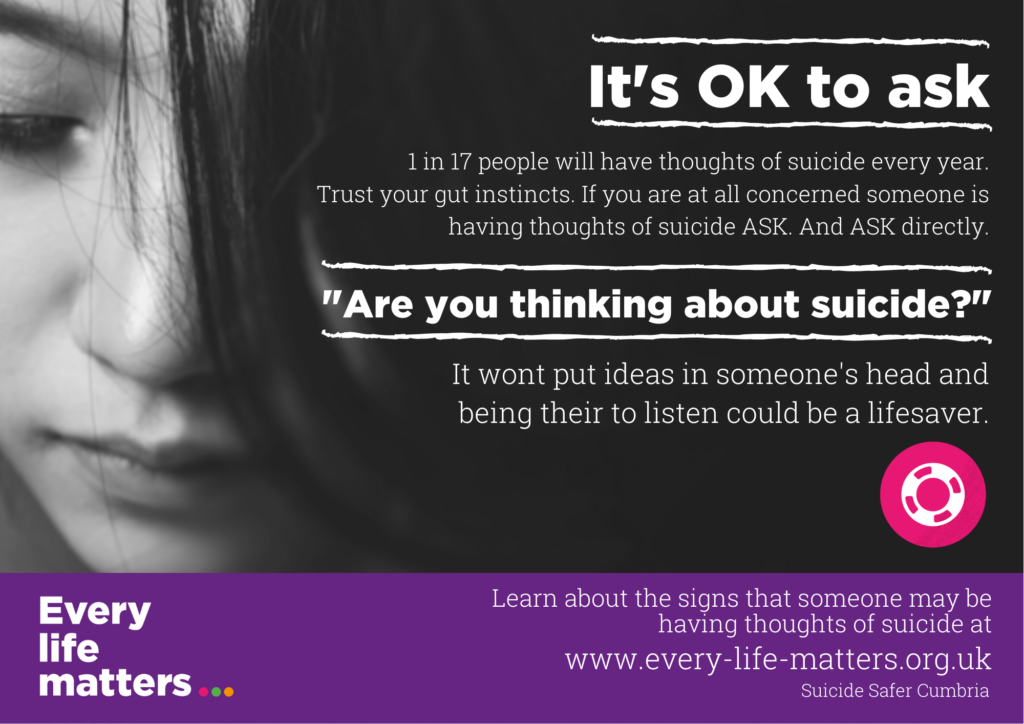
Some common fears:
“Won’t talking about suicide put the idea in their head?”
This is a myth. If a person is suicidal, the idea is already there. If they aren’t suicidal, it won’t do any harm and it will not put ideas in their head.
Asking someone if they feel suicidal or are planning to end their life may not feel like the right thing to do but in fact professionals do recommend asking direct questions about suicide.
Research has shown that speaking openly about suicide decreases the likelihood of the person acting on their feelings.
“What if they are offended or feel judged? It could damage our relationship.”
Showing someone you care about them won’t damage your relationship. Saying nothing could result in losing them forever.
“What if I say the wrong thing? Only experts can help someone who is suicidal?”
Saying something is safer than saying nothing. We can all give time and offer a listening ear, and it might come as a great relief to actually acknowledge that they’re feeling like this.
The smallest displays of kindness, like the offer of a brew, and the conversation that follows, could be the first step to helping someone… ultimately even saving a life.

How do I listen well?
![]()
The smallest displays of kindness – like the offer of a brew and the conversation that follows – could be the first step to helping someone, and could even save a life.
Don’t ever be put off approaching someone who you think may be at risk of suicide because you don’t know what to say. One of the best things you can do for a person who may be feeling suicidal is to simply encourage them to talk about their feelings. And to make sure you really listen to what they’re saying.
Talking about our fears and feelings is difficult – even to those closest to us. Words are sometimes wholly inadequate to convey the amount of pain and distress a person may be going through. It is easy to understand that someone is hurting if they have been badly injured or are physically ill. Emotional pain cannot be seen, but it can be just as unbearable.

Sometimes we need someone to simply be there. Not to fix anything or do anything in particular, but just to let us know we are cared for and supported.
Listening Tips
Ask open questions – These are questions that invite someone to say more than ‘yes’ or ‘no’, such as ‘How have you been feeling?’ or ‘What happened next?’
Offer prompts – We can encourage people to talk more through phrases such as ‘Tell me more’ or ‘Can you say more about that?’ or even simply reflecting back an important word or phrase the person has used such as ‘Overwhelmed?’ or ‘No point?’
Avoid offering solutions – Talking about someone’s problems is not always easy and its often tempting to try to offer solutions to their problems such as ‘Have you thought of doing this?’ or ‘You should try that’.
Give them time – It helps if you let them take the time they need to describe where they are at. Make sure you have time to listen. If they feel unable to speak fully at that time, acknowledge the importance of what they’ve said and arrange another time to talk.
Take their thoughts of suicide seriously – People who talk about suicide do sometimes act on their feelings – it’s a common myth that they don’t. It’s best to assume that they are telling the truth about feeling suicidal.
Take their feelings seriously – Take whatever they say seriously and without judgment, including their reasons for dying. Don’t offer platitudes like ‘things will pick up’, ‘Life’s too short’ etc and don’t minimalize their feelings by saying it’s ‘just a phase’, ‘you’ll grow out of it’ or ‘why is that even bothering you?’
Avoid judgements – You might feel shocked, upset or frightened, but it’s important not to blame the person for how they are feeling. They may have taken a big step by telling you, and comments such as “Don’t you think you might be drinking too much?” can make the situation worse.
Don’t tiptoe around the topic – There is still a taboo around talking about suicide which can make it even harder for people experiencing these feelings to open up and feel understood. If you are worried about them ask directly – ‘Are you having suicidal thoughts?’ or ‘Are you thinking about suicide?’
You don’t have all the answers – It’s okay to not know what to say! You’re a human being too and what you’re hearing might be frightening and confusing. If you don’t know what to say – be honest and tell that person.
Reassure them that you are glad they told you – this can be far more empowering and genuine than making something up. If you’re honest with them, they’ll be honest with you.
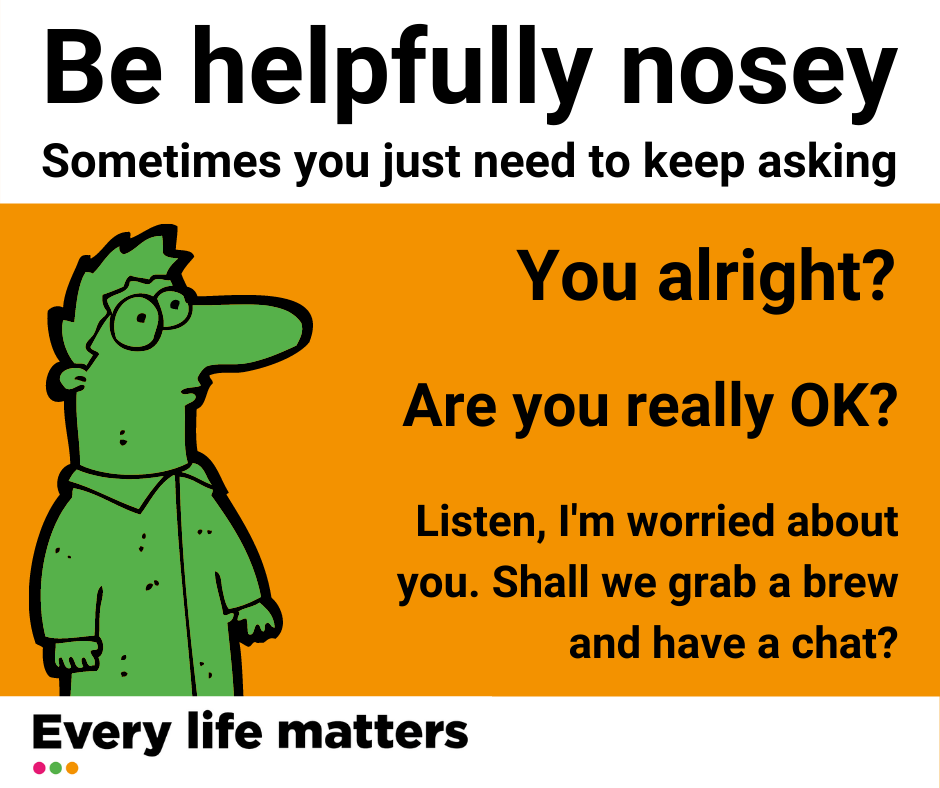
Where can someone get help?

Thinking about suicide does not make it inevitable that you are going to take your own life. There are ways to live with thoughts of suicide.
Lots of people have thoughts of suicide but the good news is that there are many people and organisations that really want to support you through this difficult time and help you to resolve whatever it is that has led you to the point of thinking about suicide. Reach out and talk.
Talking about our fears and feelings is difficult – even to those closest to us. Words are sometimes wholly inadequate to convey the amount of pain and distress a person may be going through. It is easy to understand that someone is hurting if they have been badly injured or are physically ill. Emotional pain cannot be seen, but it can be just as unbearable.
You might feel unsure of what to do, but there are lots of sources of support that might help.
Friends and Family can offer emotional and practical support and space to talk about their feelings
You can seek treatment and support from your GP or other professionals
Look for sources of advice and support that might address the problems in your life currently.
Find out about the range of Helplines and Online support forums available
Explore ideas to improve your Wellbeing and general mood.
Make a Safety Plan.
Friends and Family
Emotional support and understanding offered by family and friends can have a hugely positive effect. If people have a positive experience of opening up about their suicidal thoughts and asking for help, then many more suicides will be prevented.
Sometimes talking with friends and family about their feelings can be invaluable in helping someone feel safe and secure, and helping the thoughts of suicide pass. Some people though may need professional support to help overcome their suicidal thoughts, and the situation that has led to it.
GP’s and NHS Services
Your GP can refer you to a range of NHS mental health services including talking treatments such as CBT and Crisis support. If possible, bring someone else with you to your appointment that you trust. It helps to prepare what you want to say to your GP, and it’s very important to be open and specific about your thoughts of suicide.
Have a look at Doc Ready and Mind’s Find the Words to find out more about talking to your GP about your mental health
If thoughts of suicide are becoming more difficult to manage then you can call
North Cumbria NHS Universal Mental Health Crisis Line
0800 652 2865
South Cumbria NHS Urgent Mental Health Support Line
0800 953 0110
These are open 24 hrs a day/7 days a week and are for all ages.
Your GP may also refer you to the local NHS Crisis Team who – either for a home or hospital appointment – and this may lead to home based support for the duration of your immediate crisis.
Visit our Support Directory pages to find out more about NHS support available in Cumbria
Medication
Your GP can also prescribe medication which might help. Although there no specific drugs to treat suicidal feelings, your GP might offer you medication to help you cope with your symptoms, or to treat a mental health problem such as depression, which might be causing your suicidal feelings. Medication might include, antidepressants, antipsychotics, mood stabilisers or sleeping pills. Mind have a wide range of information about Medication here.
Other professional support
There are lots of different places someone can access help for thoughts of suicide. Have a look at our Support Directory to see some ideas of the types of services available. Alternatively, you can give one of the listed helplines a call to talk about your options for support.
Telephone/Text Helplines
There are some really helpful telephone and text helplines for people experiencing thoughts of suicide, some of which are open 24 hours a day, at times when friends and family may not be there to listen. Put their numbers in their phone. See the Telephone and Text Helplines section below or find out more on our Support Directory.
Peer Support
Many people find talking to someone who has been through the same situation as them as very supportive. Have a look at the Online Support Communities in ours Support Directory.
Safety Plan
A Safety Plan is a way of working out what might be helpful in keeping someone safe when they are having thoughts of suicide. It sets out what someone can do to help themselves and what they would do, and who might support them in a crisis. It’s also a useful way of keeping important information and contacts together in one place.
Download our Pocket Guide to Safety Planning or visit our Safety Planning page to start writing your own.
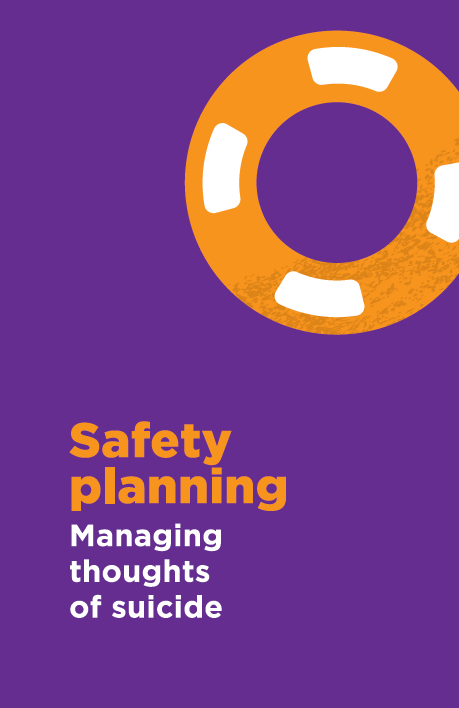
How can a Safety Plan help?
![]()
A Safety Plan is a way of working out what might be helpful in keeping yourself safe. Thoughts of suicide do pass and being prepared to manage them can make all the difference.
A Safety Plan sets out what you can do to help yourself and what you would do, and who might support you in a crisis.
They might include distraction techniques to help you get through the next seconds or minutes as thoughts of suicide becoming overwhelming, how you can make your immediate environment or situation safer, who you can contact when things get really tough, and what you can do in an emergency.
It’s also a useful way of keeping important information and contacts together in one place.
You might want to ask someone close to you, or a professional involved in your care, help you write your Safety Plan. It’s an opportunity to talk together about what to include, what has or hasn’t helped before, how the plan will be stored and who it is shared with. You can also take practical steps like storing crucial numbers in your phone, or looking at what other support is out there.
Download our Pocket Guide to Safety Planning or visit our Safety Planning page to start writing your own.

What should I do in an emergency?

Sometimes thoughts of suicide may become very intense and overwhelming, and a person may struggle to keep themselves safe. They may have made clear plans – they know where, when and how they will kill themselves.
What to do in a mental health emergency
If you, or someone you know, is having a mental health crisis then call
North Cumbria NHS Universal Mental Health Crisis Line
0800 652 2865
South Cumbria NHS Urgent Mental Health Support Line
0800 953 0110
These are open 24 hrs a day/7 days a week and are for all ages.
What to do in a suicide emergency
Sometimes thoughts of suicide may become very intense and overwhelming, and a person may struggle to keep themselves safe. They may have made clear plans – they know where, when and how they will kill themselves.
If someone tells you they’re feeling overwhelmed by thoughts of suicide, make sure they’re not left alone. Just like asking about thoughts of suicide generally, if you are worried about the person’s immediate safety ask directly. “Do you have plans to kill yourself?” “Do you know how and when you will do it?” etc.
If the person feels unable to keep themselves safe and are at immediate risk of attempting suicide stay with them and do one of the following;
Call 999 – The call is free. Explain what is happening. In this situation, calling an ambulance is the right action to take – not a waste of emergency services time as some people fear. If someone is having a heart attack the outcome could be death – just the same as if someone has tried, or is about to try, to take their own life.
Take them to a Hospital A&E– Find your nearest here.
Contact the NHS Universal Crisis Lines – North Cumbria NHS Universal Mental Health Crisis Line 0800 652 2865 or South Cumbria NHS Urgent Mental Health Support Line 0800 953 0110. These lines are staffed 24/7 and give direct access to mental health professionals.
It may also be helpful to remove things that someone could use to harm themselves, particularly if they have mentioned specific things they might use. It’s also important to help the person avoid alcohol and drugs when they are at risk.
If the person has already attempted suicide, taken an overdose or seriously harmed themselves seek immediate help Call 999 now. The call is free. Explain what is happening. Stay with the person while you wait for help to arrive.
If the person doesn’t want help or has gone missing
If someone you are worried about cannot stay safe, or has taken steps to end their life, and they do not want to get help or have gone missing – call the police on 999.
While this may feel like a drastic step to take it is a justifiable response to someone’s life being at risk. The police have the resources to find those who are vulnerable to suicide and get help to them quickly, including other emergency services if needed.
What happens if someone attempts suicide?
Under construction.
How do I look after myself?

Supporting someone who feels suicidal can be emotionally draining and really tough and it’s important to look after yourself too.
It can be hard to understand or accept that someone close to you feels suicidal. You may feel helpless, powerless, angry, sad, shocked, frightened or a whole range of other emotions unique to your own experience. There’s no right or wrong way to feel. Some people feel they are to blame if someone they care for feels suicidal, or doesn’t feel any better, but it’s important not to blame yourself for what is happening.
If you have these sorts of worries, it could help to talk to someone about how you are feeling. That could be a;
Friend or family member.
Helpline or Online community
Talking therapy
Peer support group for Carers
There’s no right or wrong way to look after yourself. After all – we’re all different. However, when supporting someone else it can be really important to take some time for yourself and ensure that at least some time during your day focuses on yourself rather than who you’re worried about – particularly if the person you are supporting lives with you.
It can help your own wellbeing to:
Make time for yourself – Find time to relax or do something you enjoy each day. It is not selfish to take time to look after yourself – it is essential.
Look after yourself physically – Eat well and get some exercise where you can. Where possible stick to existing exercise routines or classes.
Sleep well – If sleeping has become a problem you can try a variety of Apps to help or speak to your GP for help. The quality of our sleep has a significant impact on how we feel and cope with life’s challenges.
Stay organised – Supporting someone who is suicidal can be like a rollercoaster and other parts of your life can sometimes become neglected. Stick to any helpful social and physical routines where you can, and try writing down jobs you need to do, or things you don’t want to forget, to keep on top of your life.
Get help – It can be very isolating supporting someone with thoughts of suicide, and sometimes, due to the stigma or shame attached to the issue, people might find it hard to share with others what they’re going through. But there is support out there through Friends or family members, Helpline or Online communities, Talking therapies or Peer support group for Carers. See our resource section for more details www.every-life-matters.org.uk
Be realistic – You cannot fix people’s problems and there are limits to what you can do to help. Give what you can of your time, your attention and your practical support alongside empowering the person you care for to seek out and engage in other available support.
Keep perspective – Keep sight of the whole person you are supporting, not just there suicidal thoughts, and try to keep doing the things together that you enjoy.
Safety Plan – Support the person you care for to develop a Safety Plan so they can begin to take control of their own situation and identify a range of tools and support, and things they can do to help themselves, around them to help manage the thoughts of suicide.
Resources
Mind explains how to support someone who feels suicidal, giving practical suggestions for what you can do and where you can go for support.
Mind also provides a broad range of helpful guides to mental health issues.
Papyrus – Help and advice for supporting young people at risk of suicide.
Samaritans – Information about suicide prevention and supporting others.
